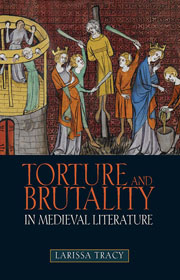Book contents
- Frontmatter
- Contents
- Acknowledgements
- Abbreviations
- Introduction
- 1 Rending the Flesh: The Orthodoxy of Torture in Hagiography
- 2 Resisting the Rod: Torture and the Anxieties of Continental Identity
- 3 The Matter of the North: Icelandic Sagas and Cultural Antonomy
- 4 The Matter of Britain: Defining English Identity in Opposition to Torture
- 5 Laughing at Pain: The Comic Uses of Torture and Brutality
- 6 Medieval Torture and Early-Modern Identity
- Conclusion
- Select Bibliography
- Index
2 - Resisting the Rod: Torture and the Anxieties of Continental Identity
Published online by Cambridge University Press: 05 September 2013
- Frontmatter
- Contents
- Acknowledgements
- Abbreviations
- Introduction
- 1 Rending the Flesh: The Orthodoxy of Torture in Hagiography
- 2 Resisting the Rod: Torture and the Anxieties of Continental Identity
- 3 The Matter of the North: Icelandic Sagas and Cultural Antonomy
- 4 The Matter of Britain: Defining English Identity in Opposition to Torture
- 5 Laughing at Pain: The Comic Uses of Torture and Brutality
- 6 Medieval Torture and Early-Modern Identity
- Conclusion
- Select Bibliography
- Index
Summary
‘An inquisitor never tortures. The custody of the defendant's body is always entrusted to the secular arm.’
Brother William of Baskerville, The Name of the Rose, Umberto Eco (p. 451)As nations sought to define themselves through legal and literary means, the spectre of torture encouraged by secular and ecclesiastical institutions loomed large and was cast as a weapon of tyranny. As Caroline Smith points out, the thirteenth century was ‘a vital one in the formation of France and its literary culture’. This formation is evident in the implicit resistance in literary sources to the legal application of torture, the perception of which is rooted in the proliferation of inquisitorial tribunals, particularly in Languedoc, in the twelfth and thirteenth centuries. James Given explains that the work of inquisitors in Languedoc is ‘persuasive testimony to the power medieval rulers could generate through the careful and determined applications of [torture] techniques’, but the same techniques employed by inquisitors for ‘seeking out, isolating, breaking down, and condemning heretics or imagined heretics were not effective in generating active support for their work’. In an attempt to quell heretical uprisings and stamp out individual sects, Pope Gregory IX codified the existing legislation concerning heresy in 1231, creating the Inquisition as an institution. It was not a single autonomous body but individual tribunals that were never unified; ‘indeed, virtually no provision was made to assure mutual cooperation between them’.
- Type
- Chapter
- Information
- Torture and Brutality in Medieval LiteratureNegotiations of National Identity, pp. 70 - 107Publisher: Boydell & BrewerPrint publication year: 2012



